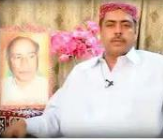By Shaikh Aziz
The news of Z.A. Bhutto’s conviction shocked the PPP workers and supporters who hadn’t thought that Gen Zia would stoop so low. Though some violent protests took place in parts of Lahore and Sindh, the general law and order situation was not seriously affected as the government had taken measures to prevent the breaking out of any violence. For some reason the upper leadership of the party remained out of the scene, leaving the PPP workers directionless.
The military courts became over-active in handing down punishments of jail time and lashing. It was clear that the government wanted to send a message to the top PPP leadership that they could also be arrested in order to keep the administration working smoothly.
Two days after the judgment, on March 20, 1978, retired Gen Tikka Khan was arrested under martial law regulation No 33 for his involvement in political activities. Benazir Bhutto who was under house-arrest at her Karachi residence moved the Sindh government to arrange her meeting with her father at Lahore jail. The meeting was arranged for March 25.
The military regime cracks down on protests in the wake of Bhutto’s conviction
The PPP lawyers worked round the clock to prepare an appeal to be filed in the Supreme Court. Some PPP leaders were of the opinion that there was no need to file an appeal against the verdict; instead they wanted to approach the military government through friendly circles to settle the matter amicably. However, saner elements in the party prevailed and finally an appeal was filed in the Supreme Court on March 25.
As the foreign minister in Ayub Khan’s government and later as the prime minister, Bhutto had developed friendships with a number of world leaders, especially in the Third World and the Arab countries. Now facing a death sentence he hoped they could prevail upon Gen Zia to spare his life. While messages from world leaders were coming in calling for a pardon for Bhutto, Libyan leader Muammar Qadhafi’s envoy, Abdul Ali Ubaidi, called on Gen Zia and conveyed to him a message from his president. Zia told him that at this stage the matter was pending with the highest court and he did not want to interfere in it.
While meeting foreign leaders Gen Zia always made sure that the meeting took place without any aide. It was, therefore, impossible to make out what the contents of the talks were and what transpired, leaving the people guessing.
Relieved of a major task of handling Bhutto which was now being done by the courts, Gen Zia focused his attention on strengthening his position politically. However he camouflaged his attempts in such a manner that he could not be blamed for being too ambitious. In this regard he was equally helped by some political leaders. He also began studying the lives and working styles of eminent dictators, like Napoleon Bonaparte, Adolf Hitler, Marshal Tito and Mussolini, who stayed in power for many years without being challenged by the people. He apparently wanted to learn how these dictators managed to retain power for so long. He also used to engage some of his associates in debates on what style of governanvce would work in Pakistan.
While messages from world leaders were coming in calling for a pardon for Bhutto, Libyan leader Muammar Qadhafi’s envoy, Abdul Ali Ubaidi, called on Gen Zia and conveyed to him a message from his president. Zia told him that at this stage the matter was pending with the highest court and he did not want to interfere in it.
During this time it appeared that the Pakistan National Alliance (PNA) was heading towards a break-up; Asghar Khan and Maulana Noorani had already parted ways. After the overthrow of Bhutto’s government, the PNA had decided to keep away from any interim arrangement offered by the military government. They remembered the performance of the Advisory Council Gen Zia had formed on Jan 14 to run the affairs of the government. Though the task of the council was to help in handling state affairs, Gen Zia himself supervised everything which negated the purpose of the council.
Continue reading A leaf from history: Zia rejects PNA’s conditions

